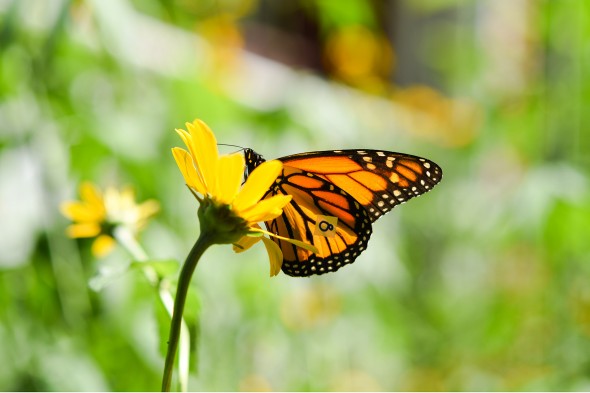UIC leads largest nationwide effort to protect the monarch butterfly

In the last 20 years, the population of monarch butterflies in the eastern U.S. has declined by more than 80%, putting the species at risk of extinction. A primary cause of this decline is the loss of habitat containing native flowering plants that butterflies need for food and breeding, including milkweed species.
Since 2017, the University of Illinois at Chicago has partnered with more than 45 energy companies and transportation agencies to develop the first nationwide Candidate Conservation Agreement with Assurances, or CCAA, which is a formal agreement between the U.S. Fish and Wildlife Service and non-federal property owners and land managers to engage in important conservation actions to protect the monarch butterfly.
The agreement, which was issued April 3 by the U.S. Fish and Wildlife Service, may benefit up to 26 million acres of land managed by energy companies and departments of transportation across the United States. Via this agreement, public and private partners can voluntarily adopt conservation measures that are beneficial to the monarch butterfly, which is currently being considered for listing under the Endangered Species Act.
“This unprecedented agreement encourages land managers to take immediate, proactive steps to support the monarch butterfly so that we can turn its decline around, while simultaneously providing regulatory certainty and operational flexibility to our nation’s energy companies and transportation agencies,” said Iris Caldwell, program manager at UIC’s Energy Resources Center, which will administer the agreement.
The development of the CCAA was undertaken by the Rights-of-Way as Habitat Working Group and facilitated by the UIC Energy Resources Center, which is part of the university’s College of Engineering, in collaboration with the U.S. Fish and Wildlife Service, Cardno and the Environmental Policy Innovation Center. The Working Group, which began in 2015, fosters collaboration across a diverse range of partners within the energy and transportation sectors.

“In line with UIC’s mission to address challenges and opportunities facing today’s cities and transform the world, we are thrilled to partner with energy companies and transportation agencies all across the U.S. to save the monarch butterfly,” said Susan Poser, UIC provost and vice chancellor for academic affairs.
The goal of the CCAA revolves around preserving existing or creating new habitat areas while also minimizing negative impacts to monarch butterflies and their habitat. The types of conservation-focused land management practices supported by the agreement include habitat set-asides, timed mowing to avoid peak periods when monarch butterflies are present, use of targeted herbicide applications to selectively treat woody and invasive plants, and other integrated vegetation management best practices that promote beneficial vegetation like milkweed and other flowering plants.
“There are millions of miles of roads, railways and utility lines crisscrossing the U.S., and there is an enormous opportunity for these corridors and other energy and transportation lands to provide the habitat resources so desperately needed by monarchs and other key pollinators,” Caldwell said.
If the monarch butterfly becomes a federally listed species, organizations who are partners on the agreement will have streamlined rules for managing habitat by continuing to follow the conservation measures set forth by the CCAA.
“Having clear regulatory guidance enables electric companies to site, permit, build and operate the energy infrastructure we need to deliver the clean energy future that our customers want and expect. EEI looks forward to working with the U.S. Fish and Wildlife Service, and other stakeholders, as the agency moves to implement this historic conservation agreement,” said Quin Shea, vice president at Edison Electric Institute.
Other industry associations similarly commend the CCAA for meeting the needs of both industry and the monarch butterfly.
“AASHTO salutes the U.S. Fish and Wildlife Service for approving this essential agreement,” said Jim Tymon, executive director at the American Association of State Highway Transportation Officials. “This decision gives state DOTs the ability to meet their highest priority to provide safe roads for the traveling public while simultaneously safeguarding the health of habitat for essential pollinators like the monarch butterfly.”
John Anderson, executive director of the Energy and Wildlife Action Coalition, added, “This agreement between the U.S. Fish & Wildlife Service and the electric power and transportation sectors represents the single greatest conservation effort of its kind to date and is a continuation of the legacy of the electric power sector in advancing voluntary conservation practices.”
According to Caldwell, the CCAA is the largest such agreement in history and was completed on one of the fastest timelines.
“Restoring this species cannot be done by the federal government alone; cooperation is key. This agreement is essential to ensuring that private landowners embrace practices that can help to protect and preserve monarch butterflies, and those private landowners will benefit from regulatory certainty in return,” said Sen. Tom Carper of Delaware. “It’s a true win-win.”
Caldwell added, “Thanks to our incredible industry partners who collaborated on this effort every step of the way, the CCAA can also serve as a model for addressing challenges to other at-risk species.”
Organizations that collaborated on the development of the CCAA include: Alliant Energy, Ameren, American Electric Power, American Transmission Co., Arizona Department of Transportation, California Department of Transportation, Colorado Department of Transportation, ComEd, Connexus Energy, Cypress Creek Renewables, Delaware Department of Transportation, Duke Energy, Edison Electric Institute, Evergy, Exelon Generation, Federal Highway Administration, Federal Railroad Administration, FirstEnergy, Florida Department of Transportation, Fresh Energy, Georgia Department of Transportation, Grow With Trees, Idaho Department of Transportation, Illinois Department of Transportation, Indiana Department of Transportation, Iowa Department of Transportation, IVM Partners, Maine Department of Transportation, Midwest Association of Fish & Wildlife Agencies, Minnesota Department of Transportation, National Rural Electric Cooperative Association, Nebraska Department of Transportation, Nevada Department of Transportation, NiSource, Ohio Department of Transportation, Oklahoma Department of Transportation, Pine Gate Renewables, TC Energy, Texas Department of Transportation, Virginia Department of Transportation and Wisconsin Department of Transportation.
